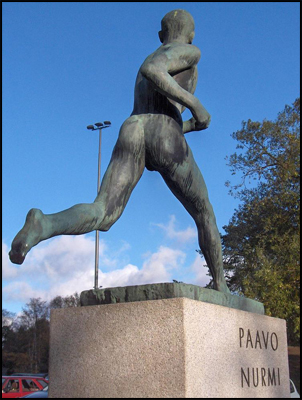Wednesday, August 8, 2007
posted by Leo Grin

Nurmi
-Proper noun
Paavo Johannes Nurmi (June 13, 1897 Turku — October 2, 1973 Helsinki) was a Finnish runner. He was known as one of the “Flying Finns”; a term given to him, Hannes Kolehmainen, Ville Ritola and others for their distinction in running. During the 1920s, Nurmi was the best middle and long distance runner in the world, setting world records on distances between 1500 m and 20 km.
Nurmi won a total of nine gold and three silver medals in the 12 events he competed in at the Olympic Games from 1920 to 1928. In 1932, Nurmi was unable to compete at the Olympics, as he had received money for his running and was thus considered a professional.
[read more at Wikipedia]
HOWARD’S USAGE:
“They’s no time like the present, before all those tramps come to. Ready? On your mark — get set — go!”
And Oslof and me left Blue River at a rate which wouldst have made Nurmi blush.
[from the ending of “Blue River Blues,” an incomplete Sailor Steve Costigan story.]
Wednesday, August 1, 2007
posted by Leo Grin
bal·us·ter
-noun
1. One of the upright, usually rounded or vase-shaped supports of a balustrade.
2. An upright support, such as a furniture leg, having a similar shape.
3. One of the supporting posts of a handrail.
[French balustre, from Italian balaustro, from balaustra, pomegranate flower (from a resemblance to the post), from Latin balaustium, from Greek balaustion.]
HOWARD’S USAGE:
Belesa and Tina, forgotten on the stair, peeping between the balusters, saw Galbro fall behind the others, loitering until the heavy door closed after them.
[from “The Black Stranger”]
Wednesday, July 25, 2007
posted by Leo Grin
guerdon
-noun
1. a reward, recompense, or requital.
-verb (used with object)
2. to give a guerdon to; reward.
[Middle English, origin: 1325-75; from Old French gueredon, of Germanic origin; compare Old High German widarlon, Old English witherlean; final element influenced by Latin donum gift]
HOWARD’S USAGE:
Ride with us on a dim, lost road,
To the dawn of a distant day
When swords were bare for a guerdon rare —
The Flower of Black Cathay
[part of the epigraph to the tale “Red Blades of Black Cathay,” a story about the resistance of the eponymous kingdom to the hordes of Genghis Khan (1162-1227). L. Sprague de Camp would no doubt have pointed out that, as used by Howard, “guerdon” is technically anachronistic, as according to the dictionary’s etymological data the word didn’t come into use until a century after the events of the story.]





